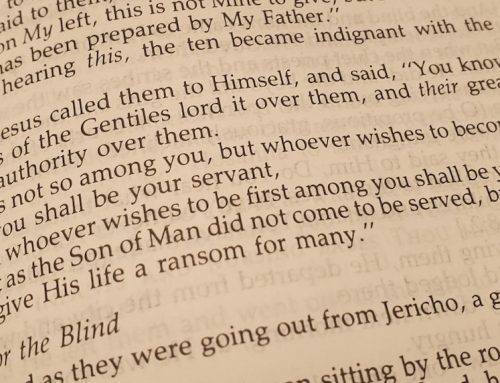This charade of unity-keeping is performed under the guise of living up to Paul’s instruction in 1 Corinthians 1:10 to “speak the same thing.” But is that anything close to what Paul meant? Is it even possible to all “speak the same thing” in the literal sense that the church currently teaches it?
Please invest some time to hear me out, and better yet, investigate Paul’s complete teaching on unity for yourself. Let’s take a look at the 1 Corinthian passage first:
1 Corinthians 1:9-17 – God is faithful, by whom ye were called unto the fellowship of his Son Jesus Christ our Lord. 10 Now I beseech you, brethren, by the name of our Lord Jesus Christ, that ye all speak the same thing, and that there be no divisions among you; but that ye be perfectly joined together in the same mind and in the same judgment. 11 For it hath been declared unto me of you, my brethren, by them which are of the house of Chloe, that there are contentions among you. 12 Now this I say, that every one of you saith, I am of Paul; and I of Apollos; and I of Cephas; and I of Christ. 13 Is Christ divided? was Paul crucified for you? or were ye baptized in the name of Paul? 14 I thank God that I baptized none of you, but Crispus and Gaius; 15 Lest any should say that I had baptized in mine own name. 16 And I baptized also the household of Stephanas: besides, I know not whether I baptized any other. 17 For Christ sent me not to baptize, but to preach the gospel: not with wisdom of words, lest the cross of Christ should be made of none effect.
The problem Paul is addressing
Before we can understand Paul’s solution to the problem at Corinth, we have to understand the problem. As Merie used to say, “If a premise is wrong, every conclusion arrived at must of necessity be wrong.” Amen to that, and it’s safe to say her wisdom in that statement condemns the very formation of the sect she started. But I digress.
The problem in Corinth was that the church was divided up into arguing factions of those who were following Paul, Apollos, Cephas (Peter), and Christ. These factions were bickering in pride over who they were following, and holding up their “patron saint” based in part on who had baptized them. We find out later in chapter 11 that they were even splitting up to participate in the Lord’s supper, with some actually getting drunk on the fruit of the vine, others being full, and still others going hungry.
Notice that even the “Christ-followers” are listed as one of the factions. Wow, that’s pretty telling. Do you understand what that means? Those who correctly shunned the following of mortal men were in this case still guilty of being divisive by insisting “we over here are the only ones following only Christ.” Claimed exclusivity is the linchpin of divisiveness.
The issue was clearly not differences of opinion on whether ladies can wear red lipstick, or blue jeans to Bible class (when in fact, they had no Bible and thus no Bible classes). In fact, it was not a doctrine at all that was dividing them, but a divisive attitude. Thus, even the ones who were correctly following Christ, not Apollos, were still being admonished to “speak the same thing.”
So what did Paul mean, then, by this instruction to “speak the same thing,” and to be “perfectly joined together in the same mind and the same judgment?” Was he implying the Corinthian church needed to get together and discuss (during the month of May, perhaps) exactly who they needed to follow, and then bind that on other believers? No, of course not. It is understood that they were to follow Christ and Christ alone.
The answer: They were to speak the same thing, and be perfectly joined together, and be of the same mind and the same judgment on WHO they followed and WHAT attitude they displayed toward each other.
Unity is about relationship and attitude. We are unified because we are in Christ together (relationship) and because we display humility and patience toward each other in love (attitude). Those are the two issues Paul addressed in verses 11 through 17, which provide the context for this question. We are to follow Christ alone, because “Christ is not divided,” and maintain the unity of the Spirit in the bond of peace. That means no bickering or factions formed over differing opinions.
I’m happy to provide an honest criticism of not only the Stanton faction of the Church of Christ on the subject of unity, but many mainline Churches of Christ, and other denominations as well. Paul’s teaching clearly means:
- No “paid preacher” vs. “mutual edification” factions
- No “multiple cups” vs. “one-cup” factions
- No “one cup” vs. “one cup with a handle” factions
- No “classes” vs. “no-classes” faction
- No “eating in the building” vs. “no eating in the building” factions
- No “fellowship hall/kitchen” vs. “no fellowship hall/kitchen” factions
- No “instruments” vs. “no instruments” factions <gasp as sacred cow gets slaughtered>
- No “wine” vs. “grape juice” factions
- No “upper room” vs. “any floor” Lord’s supper factions
- No “natural body of water” vs. “baptismal” factions
- No “colleges” vs. “no colleges” factions
Ephesians 4:3 – 3 Endeavouring to keep the unity of the Spirit in the bond of peace.
Ephesians 4:1-3 – I therefore, the prisoner of the Lord, beseech you that ye walk worthy of the vocation wherewith ye are called, 2 With all lowliness and meekness, with longsuffering, forbearing one another in love; 3 Endeavouring to keep the unity of the Spirit in the bond of peace.
The opposite of unity is discord, or division. Division is the result of divisiveness, and that is a work of the flesh, not a fruit of the Spirit. It is an attitude, not a doctrinal stance.
- Walk worthy of our calling in Jesus Christ (be Christlike)
- With lowliness and meekness… (be Christlike)
- With longsuffering… (be Christlike)
- Forbearing (being patient with) one another in love. (be Christlike)
When it comes to keeping the “unity of the Spirit in the bond of peace,” Paul assumes we aren’t going to all share the same opinions. That’s why he says unity requires us to be patient and humble toward each other, because we won’t always understand the scriptures the same way. Paul assumes that our consciences are all going to be in different places at any point in time on so many subjects, because, guess what? They are! And they always will be! And that’s to be expected, because all have been given different levels of intellect and maturity in Christ!
Romans 14:4-6 – Who art thou that judgest another man’s servant? to his own master he standeth or falleth. Yea, he shall be holden up: for God is able to make him stand. 5 One man esteemeth one day above another: another esteemeth every day alike. Let every man be fully persuaded in his own mind. 6 He that regardeth the day, regardeth it unto the Lord; and he that regardeth not the day, to the Lord he doth not regard it. He that eateth, eateth to the Lord, for he giveth God thanks; and he that eateth not, to the Lord he eateth not, and giveth God thanks.
Romans 14:19 – Let us therefore make every effort to do what leads to peace and to mutual edification.
Romans 14:22 – So whatever you believe about these things keep between yourself and God.
We can see from the above passages that unity requires no church council (May Meeting), or for teachers to get on the phone and confer with one another. Not even about such a “weighty” matter as the keeping of one day in higher esteem than another (holidays). Instead, Paul says in verse 22 to keep your opinions to yourself on it.
Wow. I thought we had to “speak the same” regarding everything from lipstick to clothing, especially something as important as observing special days. You mean Paul encouraged this to be left up to a person’s conscience? How much more the many foolish questions entertained in May Meetings over the past several decades?
Paul goes on in the next chapter to elaborate on this bottom-up idea of unity-through-mutual-forbearance, as opposed to Stanton’s top-down unity-through-authority:
Romans 15:1 – We who are strong ought to bear with the failings of the weak and not to please ourselves.
The strong ought to be patient with the failings of the weak. That word used for “failings” (infirmity in the KJV) means “error arising from weakness of mind.” It’s a mistake in one’s thinking. So if a person is making a mistake in their thinking, other believers ought to be patient with that person while they grow. Maybe they will never reach the “intellectual and spiritual heights” that you have. But the instruction doesn’t say give them a year or two, and if they still don’t agree with you, withdraw from them.
Romans 15:5-7 – May the God who gives endurance and encouragement give you the same attitude of mind toward each other that Christ Jesus had, 6 so that with one mind and one voice you may glorify the God and Father of our Lord Jesus Christ. 7 Accept one another, then, just as [in the same way that] Christ accepted you, in order to bring praise to God.
Paul clearly states that unity is an “attitude of mind” in verses 5 and 6.
Also notice verse 7, that we are to accept one another just as Christ accepted us. Well, how did Christ accept us? Was it admittedly with many errors in our thinking, or did we come into Christ with perfect understanding? Did Christ accept us based on our obedience to the simple gospel message as preached in Acts 2 on Pentecost, or did he require us to have a perfect understanding of all the doctrines of the church (and I would argue, of men)? Whatever standard we believe Christ used to accept us, we better use to accept one another: Accept one another, then, in the same way that Christ accepted you.
Some groups may persist in teaching their mistaken idea (for instance, insisting on one form of preacher support vs. another) for a lifetime, but if they have a spirit of love and forbearance for their brothers who understand the subject differently, I see no problem with maintaining brotherly interaction. It’s when one group insists that it’s their way or the highway that we have a divisive, factional attitude to deal with. Thar self-righteous, exclusive “I’m right and you’re wrong” attitude is exactly what Paul is teaching against in 1 Corinthians 1, Romans 14 and 15, and Ephesians 4.
Conclusions
It is a gross perversion of scripture, and is in fact bordering on authoritarian– and totalitarian-ism to demand unanimity of opinion. Freedom of conscience and church autonomy, not to mention truth, are sacrificed on the altar of unity when unanimity is the idol of our devotion. There is an old saying:
A man convinced against his will is of the same opinion still.
Opinions can never be genuinely changed either by authoritarian demands or by acquiescence to those demands. Opinions are private property. They can only be changed by arguments (logic) addressed to the reasoning faculties that God gave to each of us. Our capacity to think and reason are a matter of God-given ability, education, and maturity. Since God has given each of us a different intellect, and we each start our journey of faith with a different level of education and maturity, it is foolishness to expect or demand that all Christians be on board with the same opinions at the same time.
That is like a runner dragging the finish line behind him. He can never lose, but everyone else is guaranteed to lose. It is comparing ourselves by ourselves, rather than to the one clear standard, Jesus Christ himself. I recommend to every reader Alexander Campbell’s Parable of the Iron Bedstead below.
The Parable of the Iron Bedstead
by Alexander Campbell
In the days of Abecedarian Popes it was decreed that a good christian just measured three feet, and for the peace and happiness of the church it was ordained that an iron bedstead, with a wheel at one end and a knife at the other, should be placed at the threshold of the church, on which the christians should all be laid. This bedstead was just three feet in the casement on the exactest French scales. Every christian, in those days, was laid on this bedstead; if less than the standard, the wheel and a rope was applied to him to stretch him to it; if he was too tall, the knife was applied to his extremities. In this way they kept the good christians, for nearly a thousand years, all of one stature. Those to whom the knife or the wheel were applied either died in the preparation, or were brought to the saving standard.
One sturdy fellow, called Martin Luther, was born in those days, who grew to the enormous height of four feet: he of course feared the bedstead and the knife, and kept off at a considerable distance deliberating how he might escape. At length he proclaimed that there was a great mistake committed by his ancestors in fixing upon three feet as the proper standard of the stature of a good christian. He made proselytes to his opinions; for many who had been tried on the three-foot bedstead, who were actually four feet, had found a way of contracting themselves to the popular standard. These began to stretch themselves to their natural stature, and Luther had, in a few years, an iron bedstead four feet long, fashioned and fixed in his churches, with the usual appendages. The wheel and the knife soon found something to do in Luther’s church; and it became as irksome to flesh and blood to be stretched by a wheel and rope to four feet, or to be cut down to that stature, as it was to be forced either up or down to the good and sacred three-foot stature. Moreover, men grew much larger after Luther’s time than before, and a considerable proportion of them advanced above his perfect man; insomuch that John Calvin found it expedient to order his iron bedstead to be made six inches longer, with the usual regulating appendages.
The next generation found even Calvin’s measure as unaccommodating as Luther’s; and the Independents, in their greater wisdom and humanity fixed their perfect christian at the enormous stature of five feet. The Baptists at this time began to think of constructing an iron bedstead to be in fashion with their neighbors, but kindly made it six inches longer than the Congregationalists, and dispensed with the knife, thinking that there was likely to be more need for two wheels than one knife, which they accordingly affixed to their apparatus. It was always found, that in the same proportion as the standard was lengthened, christians grew; and now the bedstead is actually proved to be at least six inches too short. It is now expected that six inches will be humanely added; but this will only be following up an evil precedent; for experience has proved, that as soon as the iron bedstead is lengthened, the people will grow apace, and it will be found too short even when extended to six feet. Why not, then, dispense with this piece of popish furniture in the church, and allow christians of every stature to meet at the same fireside and eat at the same table?–The parable is just, and the interpretation thereof easy and sure.
Every attempt at reformation since the rude but masculine efforts of Luther, has been based upon the same principles. He did not like the popish superstructure, notwithstanding he built upon the same foundation. So did all his successors. They all divided the New Testament into two chapters. The title of the one was, the essentials–and the title of the other was the non-essentials. In one party the one chapter, and in another party, the other, is much the larger. Still the volume comprises but two chapters, however disproportioned they may be. Many efforts have been made to reduce the chapter of Essentials into narrower limits; but as it is reduced the other is enlarged, and the old division is kept up.
The book called The Creed contains all the essentials; and as they are there correctly arranged and soundly digested, this book is more the subject of controversy than the Testament, which has the essentials and the non-essentials all jumbled together.
Suppose, then, that a number of churches should agree to throw aside the iron bedstead, and take the book in one chapter, and call it their Creed and Book of Discipline. What then? Oh! says Puritans, Methodists, Presbyterians, Episcopalians, &c. &c. do this. Stop, my friend, not one of them dare trust themselves upon this bottom; they all have their creeds and disciplines to keep them from sinking. What then if an experiment should be made, and a fair trial of the adequacy of the Divine Book should be given; and whenever it fails of the promised end, let any other device be tried. But among all the experiments of this age and country, it is nowhere recorded that such a trial has been made and failed. I am aware of all that can be said on the other side, and still I assert that no such an experiment and result are on record. And, moreover, I do not think it is likely that it shall ever be proved by actual experiment that the New Testament, without a creed [or May Meetings], is insufficient to preserve the unity, peace, and purity of any one congregation, or of those of any given district. But above all, let us have no more iron bedsteads, with or without wheels or knives.
Can the Stanton organization ever rid itself of one of its founding premises, that unity equals unanimity? Faulty premises always bear the fruit of faulty conclusions, as Merie said, and the fruits of this movement make clear there is something wrong with the tree. I don’t know if pride will ever allow the organization to reform itself, but I know individuals always can. True reform always starts in the heart.






I have within the past few years become libertarian politically , and I see how this applies spiritually (in a sense)Why were we all created with a individual DNA , a different fingerprint unlike anyone else unless God knows and works wih us as an individual? He doesn't expect us to think the same and understand the same at the same time or have the same conscience in things. Those that go along with the teaching for the day are not really honest with themselves.Like myself I believed the "church" was the only place to be saved so I overlooked… Read more »
Amen, Loraine. The spirit God gave us will cry out for freedom, and once free, will never allow itself to be enslaved again.
Galatians 5:1-6 – It is for freedom that Christ has set us free. Stand firm, then, and do not let yourselves be burdened again by a yoke of slavery. … The only thing that counts is faith expressing itself through love.
Great article Kevin! To me it seems that the sect just doesn't believe that what Christ did for us is good enough. For decades I never understood what being "spiritual" was; only that it was what the preachers/teachers referred to themselves as and it was something that I was not. I thought it must be some mystical state of being that made one able to see everything evil about others because they possessed a state of holiness so had "spiritual eyes." Many years later I learned the true meaning of what being "spiritual" is and it really shows the simplicity… Read more »
"Does the misapplication of 1 Corinthians 1:10 become more clear now? "No it does not.Kevin, I couldn't count to you the amount of times the church has decided that is something left to an individual conscience. I won't begin to name these judgments because I would add fuel to your fire (in other words, disclose to you more about the Church).You simply have a problem with authority. However, God set authority in the Church for a reason.Have you never considered, did you never see older teachers on totally different pages when it came to May week. That in and of… Read more »
1) I have no problem with authority if it is backed up by Scripture. Period.
2) You are operating under an incorrect definition of what "unity" is. It is not unanimity of opinion. I am not the one telling you you have to go to my church to be saved. My congregation is doing all kinds of awesome things to be unified and avoid factions. I would suggest that the goal of becoming "one mind" on things God never intended you to be "one mind" is the very thing that has led to Stanton's authoritarian rule over individuals' consciences.
Things my congregation does to be unified and avoid factions:
1) Strongly preach the Good News of Jesus Christ (death, burial, resurrection)
2) Strongly preach the Doctrine of Christ (love)
3) Avoid silly questions like eating in a building, wearing nylons on Sunday, bringing baby bottles into the building, women nodding their heads during the Lord's supper, how often married couples should come together, when they should not come together, etc. etc. etc.
I agree with Kevin on the point of having unity and avoiding factions. The best way to avoid factions is not to allow opinions to be a matter of church teaching. The church shouldn't make decisions on subjects that are personal opinion such as nylons, travel, frequency of marital relations, etc. I agree that the church has decided that some things are left to the conscience but why are some things decided by the church that should really be left up to conscience like nylons, travel etc. There is a difference in deciding something and discussing something. Discussing something leaves… Read more »
Have you (the reader) considered that Merie's idea of unity was born from her interest in communism? The consequence of strict adherence to unity, of church judgments/understandings, is loss of personal freedom (liberty). Paul addresses this issue all throughout the book of Galatians. Galatians 5:1- Stand fast therefore in the liberty wherewith Christ hath made us free, and not be entangled again with the yoke of bondage. What is the purpose of this New Testament Law? Galatians 3:19-19, asks, "Why the Law then?" Paul's answer is that the Old Testament Law reveals man's utter sinfulness, inability to save himself and… Read more »
I meant Galatians 3:19-29
This is just my opinion but I think when a discussion at May Week comes to an end it does not necessarily mean everyone is in full agreement, I believe some just would rather 'switch then fight'. If you listen to May Meeting discussions there are really very few people discussing the issues. I wonder, after discussing the topics in their congregation, how many people come to the meeting with a different understanding than the one forwarded by a few people but they don't say anything. I really wonder how many brethren believe the decisions or just follow them so… Read more »
Anon 3:40, you're absolutely right. Their so-called unity is the fallible work of men, as evidenced by their frequent unity on error. If it was the Holy Spirit producing the unity, he would have guided them into all truth.